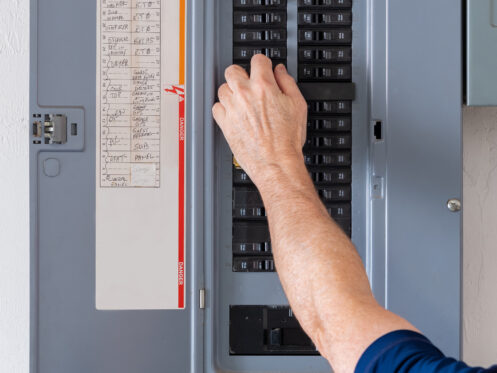A tripped circuit breaker isn’t always cause for panic, but if it keeps happening, it signals a real issue. Instead of guessing, call the experts at High 5 Plumbing, Heating, Cooling & Electric. Our licensed electricians use advanced tools to inspect your wiring, outlets, and breaker box — and quickly identify the problem.
We proudly serve Denver and the surrounding communities with fast, friendly electrical repair services.
Circuit Breaker Basics
Circuit breakers are essential parts of your home’s electrical system. They interrupt the flow of electrical current within a split second of detecting an overload or short using magnets or metallic strips that open a mechanical switch, often with a spring-loaded mechanism inside. This complex safety mechanism prevents serious shocks, electrocution, and electrical fires.
While it is possible to reset a tripped breaker by flipping the switch in the electrical panel fully to the “off” setting and then back to “on,” you should never ignore a tripped circuit breaker. A “trip” means the breaker has sensed abnormal amounts of electricity and has opened or “broken” the circuit so no more electricity can flow to the problem area.
Sometimes it’s a simple issue of having too many appliances running at the same time, but if the breaker continues to trip, there’s a serious electrical problem that needs to be addressed by a professional.
Common Causes of Breaker Tripping
A tripped breaker is usually caused by one of the following issues:
- Overloaded circuit: When too many appliances draw power at the same time, the circuit overloads and causes the breaker to trip.
- Short circuit: If a “hot” wire with electrical current touches another hot wire or a neutral wire, it’ll cause an unusual amount of electrical current, leading to breaker shutoff.
- Ground fault: If the electrified “hot” wire contacts the copper ground wire or the side of the metal outlet box, the return path of the current is redirected, creating a serious risk of electrocution and tripping the breaker.
- Arc fault: Electricity will “arc” unintentionally following an unintended path because of a loose connection or damaged wiring, creating intense heat and electrical dangers. After detecting the high power discharge, a breaker will trip.
Troubleshooting Steps
When a breaker trips, turn off and unplug the devices on that circuit, and look for any visible damage or burn marks on outlets, switches, etc. If it looks normal, reset the breaker at the electrical panel and wait to see if it trips again.
- If the breaker trips again immediately, there may be a short circuit or ground fault problem. Keep the power off and call an electrician.
- If the breaker trips when two or more appliances are in use, it’s probably an overload issue.
- If the breaker only trips when a certain appliance is used, the appliance itself may be causing the short.
It’s not a good idea to reset the breaker without knowing why it was tripped in the first place, especially if it’s a frequent occurrence. Ignoring the underlying cause or resetting a damaged or burnt breaker could lead to serious electrical issues, including fires or a risk of shock or electrocution.
When to Call a Professional
Call a professional if:
- You don’t know why your circuit breaker tripped.
- It trips more than once.
- There are visible burn marks on the outlets or switches.
- You can see damage on the electrical panel or wiring.
At High 5 Plumbing, Heating, Cooling and Electric, we specialize in electrical panel replacement and repair services, keeping Denver-area residents safe with working electricity.
Hiring a licensed, insured professional will ensure all work is done according to the latest electrical codes and all the proper permits for electrical work have been obtained, if necessary. Electricians will repair and install electrical components correctly and give you expert recommendations on how to avoid future breaker issues. Best of all, you’ll have peace of mind, knowing your family, your home, your appliances, and your electronics are safe.
Preventative Measures
One of the easiest ways to prevent tripping breakers is to avoid overloading the circuits. Plug different devices into different locations around the house when you can, and if you plan on installing a new large appliance, have an electrician install a specialized circuit with an appropriate outlet.
You can also:
- Unplug any devices you’re not using at the moment to reduce the load put on any one circuit.
- Install GFCI outlets that’ll trip at the outlet itself, not the breaker, when the current is imbalanced.
- Keep liquids away from any electric outlets, panels, and switches to prevent ground faults.
- Check the panel for damage, and have it repaired right away.
- Have an older electric panel updated to avoid tripping due to the wear and tear of age, such as weakened springs or outdated wiring.
These preventative measures will help you avoid unnecessary power outages and potential damage to your electronic devices.
Need Help With a Circuit Breaker? Call The Professionals High 5 for All Your Electrical Needs
Coloradans trust High 5 because of our dedication to working swiftly and effectively, offering premium quality work at affordable prices. We’ll take the time to listen to your concerns and learn your needs, working within your budget and providing financing options.
If your breakers keep tripping, contact our team without delay. We offer the best electrician services in the Denver region, and we understand how important it is to have working, safe power throughout your home. Let our expert electricians guide you to the right solution.

